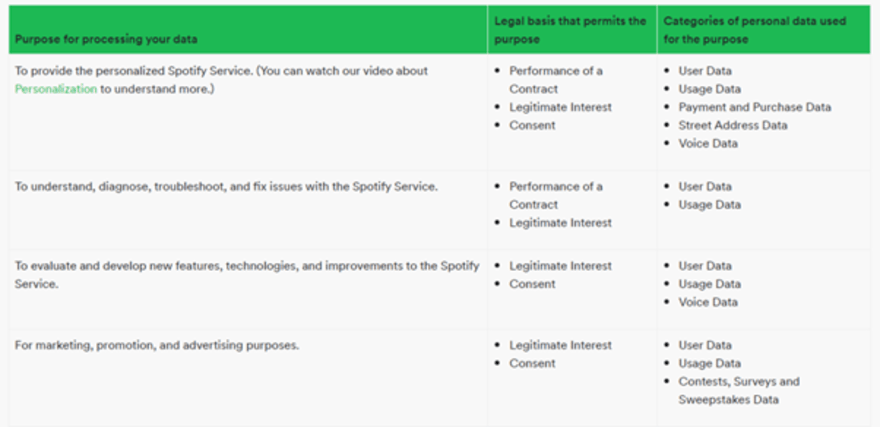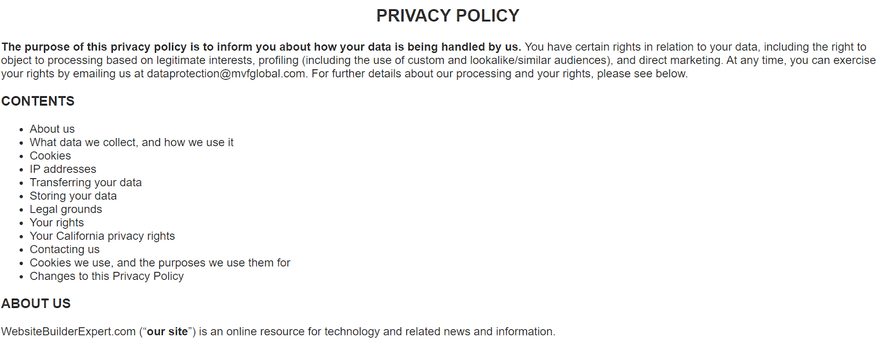How to Write a Privacy Policy for Your Website
If you click to purchase a product or service based on our independent recommendations and impartial reviews, we may receive a commission. Learn more
Every time a customer interacts with your online store, chances are that you will collect data about it. In fact, almost every website or mobile app collects data from its users in some way. But with so much information flying around, how can you make sure your customers feel safe?
That’s why it’s so important to know how to write a privacy policy when building a website that’s honest, transparent, and covers all legal bases. So you can protect yourself, and your customers!
Read on to learn more about how to write a privacy policy for website.
What Is a Privacy Policy?
A privacy policy is a statement on your website or mobile app that clearly explains what kind of information (or “data”) you collect from your users, why you collect it, and how you use it. A thorough and well-written privacy policy can give your customers the confidence to buy your products without fear that their personal information will fall into the wrong hands.

Why Are Privacy Policies Important?
As well as being a legal requirement in most countries, a privacy policy also helps to establish trust with your customers by showing them exactly how you use their data.
Keep in mind important data protection legislation such as General Data Protection Regulation (GDPR) and the California Consumer Privacy Act (CCPA), which have become blueprints for many other data privacy laws globally.
How To Write a Privacy Policy
Here are a few essentials to remember when you think about how to write a privacy policy for website:
List the Data You Collect
Make sure that you clearly list the different types of personally identifiable data that you collect from your customers, such as:
- Name and address
- IP address
- Email address
- Phone number
- Payment information
When you think: how to write a privacy policy for my website? Consider how this information is collected, for example, via cookies, when placing an order, or signing up to a newsletter.
Detail How That Data Will Be Used
When you write privacy policy for website, letting your customers know why you’re collecting their data in the first place and how you’re going to use it is a great way of encouraging trust and loyalty with your brand.
This is the part where you can also tell them the benefits of using their data – for example, to make sure their order is delivered on time, to tailor their shopping experience to them, and to show them related products which could be appealing to them. Read up on email marketing best practices to learn more about how best to do this.

Highlight How You Protect Personal Data
Reassure your customers that their personal information is safe in your hands. It’s important to make it clear that you have strict security protocols regarding their data. Let them know that their information is encrypted using Secure Socket Layers (SSL) and that only authorized persons would be allowed access, abiding by your website’s strict security protocols.
Disclose Any Data Sharing With Third Parties
Above all, most of your customers will be concerned that their personal information will be shared with third parties. No one likes receiving unsolicited spam! If you do share customer information with third parties, make sure you explain clearly how and under what circumstances you do so.
Specify the Collection and Use of Children’s Data
Whether your online store is targeted towards children or not, your privacy policy must have a clause that addresses child privacy.
According to the Children’s Online Privacy Protection Act (COPPA), it could be illegal for your store to collect data from children aged 13 or younger without following COPPA guidelines. So, this is an absolute must to consider when you write privacy policy for website.
Explain How Cookies Are Used on Your Site
Whenever a user lands on your website, they will need to agree to the use of cookies or other tracking technologies for authenticating purposes and analyzing site traffic and trends. Make your customers aware of how their data is collected and used clearly – using a bit of humor is encouraged! (see below). Creating a social media strategy is a great way of attracting more users to your website.

Advice from the Experts
Top tip: Have a Separate Cookie Policy
It’s a good idea to have a separate cookie policy that you can link to within your privacy policy to give more in-depth information. This not only reassures your customers with as much information as possible, but solves the practical problem of having so much text in one place!
Communicate How Users Can Access and Edit Their Data
Be clear how your users or website visitors can access, transfer, change or delete the information that you collect. This is covered by both GDPR and CCPA guidelines so it’s an important one.
Advice from the Experts
Top tip: Include a Data Subject Access Request (DSAR) Form
You could include a Data Subject Access Request (DSAR) form in your privacy policy to make it easier for your users to submit data access requests. This just involves creating a form on your website for the customer’s name, address, email address and their message.
Provide Details on Who To Contact Regarding the Privacy Policy
Let your users know how they can get in contact if they have any concerns about your use of their personal data. Provide as much information as you can, such as an email address, postal address or phone number. This helps show that your business is open, honest, and happy to discuss the use of customers’ personal data with them.

Templates: Your Secret Weapon
If you choose to write your own privacy policy for your website, you’ll find it can be pretty time-consuming. Some businesses do choose to write their own, but for others there simply isn’t the time or resources available to do so.
Whatever the needs of your business, there’s no harm in getting a little help from using pre-crafted templates online. Be sure to find one that is most suited to your business, and check to see if it’s applicable to how your online store uses customers’ personal data.
There are even privacy policy generators online, such as PrivacyPolicies and FreePrivacyPolicy, which can create a tailored privacy policy in a few easy steps.

However you choose to write a privacy policy for your website, we’d recommend getting a hired professional to look over it for you before publishing it online.
Summary
We know privacy policies won’t be the most exciting thing about your website. But they’re super important. Not just for the trustworthy image of your company’s brand, but for everybody!
They protect our data from falling into the wrong hands and being used in ways that we didn’t consent to. Your privacy policy is where you can show your users that you care about them, by being upfront, honest, and open about how you use their data to deliver the best service possible.

Leave a comment